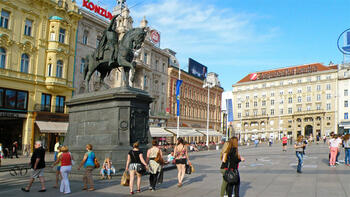
The Balkan region has impressive potential for knowledge intensive jobs in Europe. While Albania is far behind, there is a strong growth of knowledge intensive jobs. Serbia and North Macedonia have strong growth and even further potential for growth due to relatively high expert density. Croatia and Slovenia already overperform in brain business jobs relative to their expert density, and the Zagreb capital region is amongst the top-10 most knowledge intensive regions in all of Europe.
In Albania, 1.7 percent of the working age adults are employed in brain business jobs during 2025. This is a term for employment in knowledge-intensive firms in tech, information and communications technology, advanced services, and creative professions. While the lowest rate in all Europe, the share of knowledge intensive workers has increased significantly from 1.4 percent the year before. A significant growth of knowledge intensive jobs is occurring in Albania, signifying catch-up. Albania has particular relative strengths in telecommunications, where 4 300 are employed. The country has also recently developed a relatively strong IT services sector, with 2 900 employees.
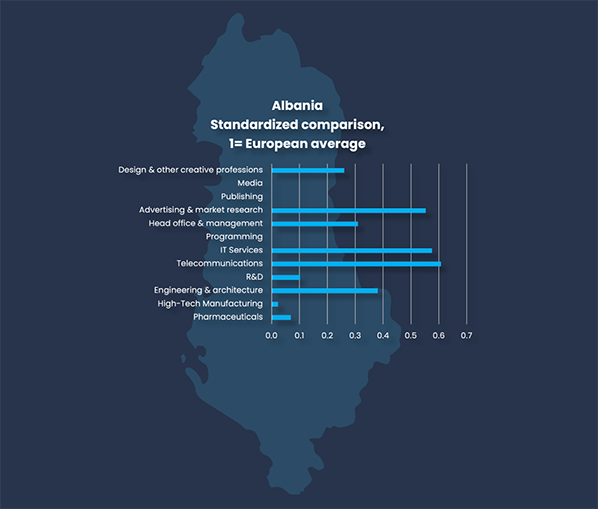
North Macedonia performs somewhat better, with 4.7 percent of the adults employed in highly knowledge intensive jobs. This region is also catching up significantly, with share of adults in brain business jobs climbing from 4.1 percent a year ago. There is strong opportunity for further growth, as North Macedonia underperforms in terms of share of brain business jobs amongst the adults, and the share of adults who are engineers and scientists. There is a talent pool with competitive wages, to fill in more knowledge-intensive jobs, in North Macedonia. North Macedonia has particular relative strengths in IT services, where 3 050 are employed. The country has also recently developed a relatively strong pharmaceutical sector, with 2 650 employees.
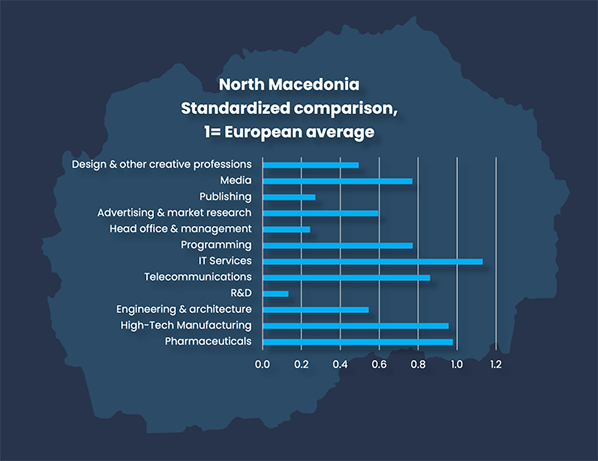
In Serbia, 5.4 percent of the adults work in brain business jobs, up from 5.2 the year before. This means that Serbia is nearly as knowledge intensive as Spain and Italy, just lagging behind due to low share of adults employed in design and other creative professions. With integration in European service trade, and focus on competitive taxation and regulation, Serbia has significant potential for growth. The country has a relatively high share of adults who are engineers and scientists. In relation to the share of knowledge intensive jobs Serbia has a surplus of experts, which signals potential for further growth.
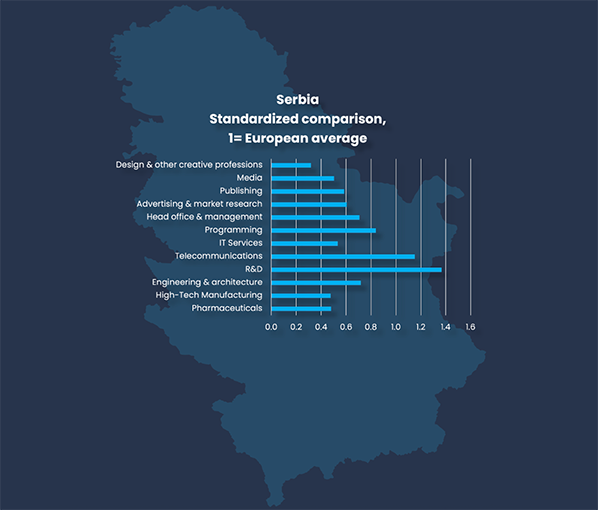
Higher up in the knowledge intensive jobs ladder is Croatia, where 7.0 percent of adults work in brain business jobs. This is a major increase from 6.6 percent the year before. The level has risen from 3.7 percent in 2014, nearly doubling since. Croatia overperforms in share of adults in brain business jobs, as related to share of adults who are engineers and scientists. This indicates that taxation and business policy, and more trade integration within Europe, allows Croatia to overperform in relation to its expert density, while Serbia and North Macedonia underperform and have massive opportunity to catch-up.
Croatia has particular relative strengths in telecommunications, where 10 550 are employed. The country has recently developed a relatively strong engineering & architecture sector, with 33 300 employees. In the Zagreb region as many as 18.9 percent of the adults are employed in brain business jobs, this is the 8th highest share in a regional comparison, with all European regions that data exists for. The Jadranska Hrvatska region also has a relatively high share, 4.9 percent.
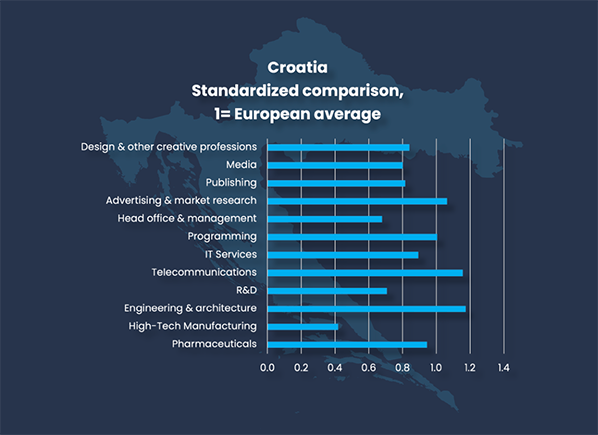
The star of the region is Slovenia, where fully 9.2 percent of the adults work in brain business jobs. This is a significant improvement from 8.6 percent the year before. The level has grown from 5.4 percent in 2014. Thanks to this strong growth, Slovenia currently has the eight-highest share of brain business jobs in Europe. Much like Croatia, Slovenia overperforms in share of adults in brain business jobs, compared to share of adults who are engineers and scientists.
Attractive taxation and business policy allow for more jobs than expert density alone would predict. Slovenia has particular relative strengths in pharmaceuticals, where 12 300 are employed. The country has also recently developed a relatively strong research & development sector, with 4 950 employees. In the Ljubljana capital region, fully 11.8 percent of adults are employed in brain business jobs. This is significantly higher than 6.7 percent in the Vzhodna Slovenija region.
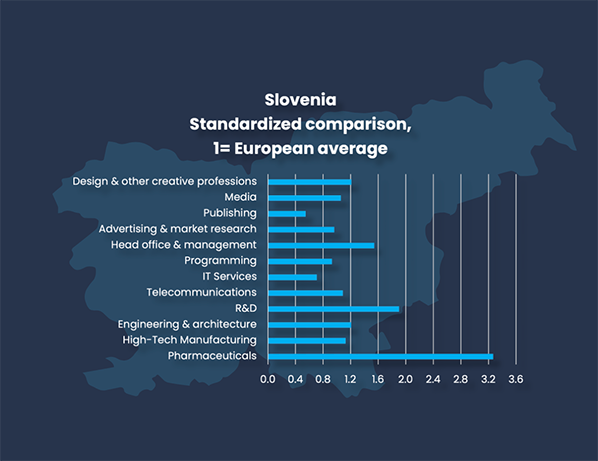
There is significant opportunities for growth of brain business jobs in the Balkan region. Slovenia and Croatia have strong performance, while Serbia and North Macedonia have strong growth and due to high expert density continued growth potential. Albania lags the rest of Europe, but is growing steadily with knowledge intensive jobs. The capital region of Zagreb in particular is interesting, since it is amongst the top-10 European regions with highest share of knowledge intensive jobs. This region illustrates how expert density and competitive policy with lower taxes can promote knowledge intensive jobs growth, also the Balkan region can today reach the top of the European knowledge leader.
The Balkans should not be underestimated, much like the Baltic region to the north of Europe, this group of smaller countries can with continued institutional competition, transform into vibrant growing knowledge economies of Europe. While the larger European nations stagnate with high taxes and rigid government control, it is the smaller ones that through institutional competition outpace in growth and welfare.
Author: Nima Sanandaji, Director European Centre for Entrepreneurship and Policy Reform.
Lead image: Central square of the city of Zabreb, Croatia, by Miroslav Vajdić, under CC 2.0 License.
| Attachment | Size |
|---|---|
| tech-jobs_albania.png | 75.81 KB |
| tech-jobs_croatia.png | 109.83 KB |
| tech-jobs_macedonia.png | 103.26 KB |
| tech-jobs_serbia.png | 88.7 KB |
| tech-jobs_slovenia.png | 105.43 KB |












